Greetings, fellow rabbit enthusiasts! Today, we are here to address a burning question that has been the subject of much discussion among rabbit owners: Can rabbits eat popcorn? As dedicated caregivers, we understand the importance of providing our furry friends with a safe and healthy diet. So, let’s dive into the world of rabbit nutrition and debunk some myths along the way.
Key Takeaways:
- Popcorn is not an ideal food for rabbits due to its low nutritional value and high carbohydrate content.
- Rabbits should primarily consume hay, fresh vegetables, and limited amounts of pellets for a balanced diet.
- Introduce new foods gradually and in moderation to avoid digestive issues.
- Consult with a veterinarian to create a suitable diet plan for your rabbit.
- Signs of an unhealthy diet in rabbits include digestive problems, dental issues, obesity, and vitamin deficiencies.
Understanding a Rabbit’s Diet and Nutrition Needs
When it comes to keeping our furry friends healthy, understanding their diet and nutrition needs is essential. Rabbits, in particular, have unique dietary requirements due to their sensitive digestive systems and specific nutritional needs. To ensure the well-being of our beloved rabbits, it is crucial to provide them with a balanced diet that supports their overall health.
The Rabbit Digestive System
The digestive system of rabbits is designed to efficiently process a high-fiber, plant-based diet. In the wild, rabbits primarily consume hay, grass, and other fibrous vegetation, which helps maintain their dental health and supports proper gastrointestinal function.
The Importance of Hay and Fresh Vegetables
Hay is the cornerstone of a rabbit’s diet and should make up the majority of their food intake. It provides essential fiber that aids in digestion and prevents gut stasis, a dangerous condition in which the digestive system slows or stops entirely. Additionally, fresh vegetables, such as leafy greens and carrots, offer additional nutrients and variety to their diet.
- Hay: Timothy hay, orchard grass, and meadow hay are excellent options for rabbits. Ensure it is fresh, dry, and free from mold or dust.
- Fresh Vegetables: Introduce a variety of fresh vegetables gradually to avoid digestive upset. Leafy greens like romaine lettuce, parsley, and cilantro are great choices.
Pellets and Limited Treats
Pellets formulated specifically for rabbits can be included in their diet, but they should be given in limited quantities. Look for high-quality, timothy hay-based pellets without added sugars or fillers.
While it may be tempting to offer rabbits treats like popcorn, it is important to remember that these should only be given sparingly, if at all. Treats should never replace the primary components of their diet and should be limited to small portions of safe, rabbit-friendly options like small slices of fruit or herbs.
By understanding a rabbit’s diet and nutrition needs, we can provide them with the proper care and ensure their long-term health. A diet rich in hay, fresh vegetables, and limited pellets, along with plenty of fresh water, will support their overall well-being and help them thrive.
Exploring the Safety of Popcorn for Rabbits
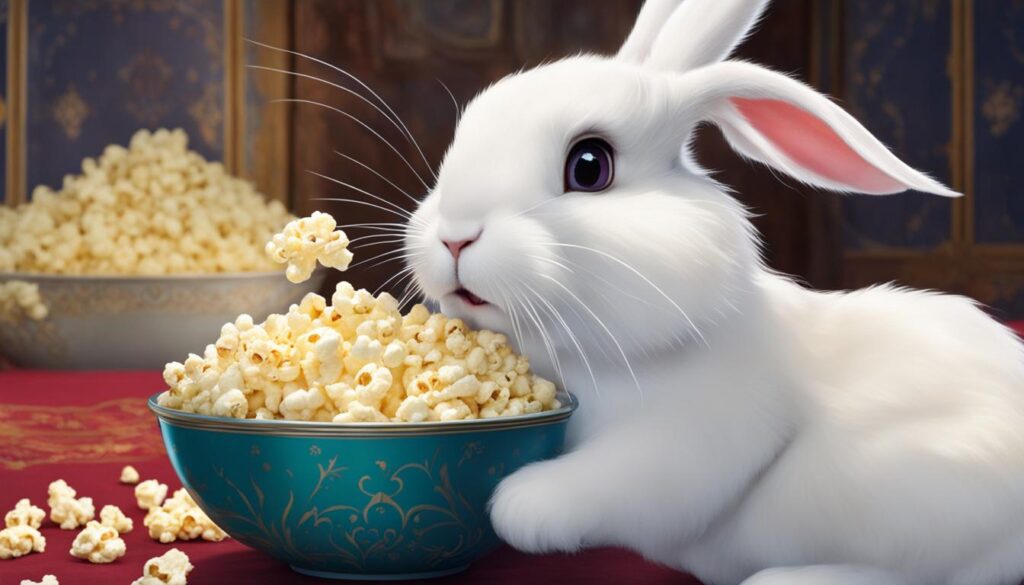
Popcorn is a popular snack enjoyed by many, but can rabbits eat popcorn? While it may be tempting to share this crispy treat with your furry friend, it’s important to consider the safety and nutritional value of popcorn for rabbits.
Popcorn is low in nutritional value for rabbits. It mainly consists of carbohydrates, which can lead to weight gain and potential digestive issues in rabbits. Additionally, the salt, butter, and other seasonings often used to flavor popcorn can be harmful to bunnies.
If you still want to give your rabbit a special treat occasionally, it’s best to opt for safer alternatives. Fresh fruits and vegetables, such as carrots, apples, and leafy greens, are healthier options for rabbit snacks. These natural treats provide essential vitamins and minerals that contribute to your rabbit’s overall well-being.
The Bottom Line: Choose Healthier Snacks for Your Rabbit
While popcorn may seem like a harmless snack, it is not an ideal food for rabbits. It lacks nutritional value and can potentially cause health issues. Instead, focus on providing your bunny with a balanced diet that consists of hay, fresh vegetables, and limited pellets. By choosing healthier snacks and following a proper feeding regimen, you can ensure your rabbit stays happy and healthy.
Healthy Alternatives for Bunny Treats
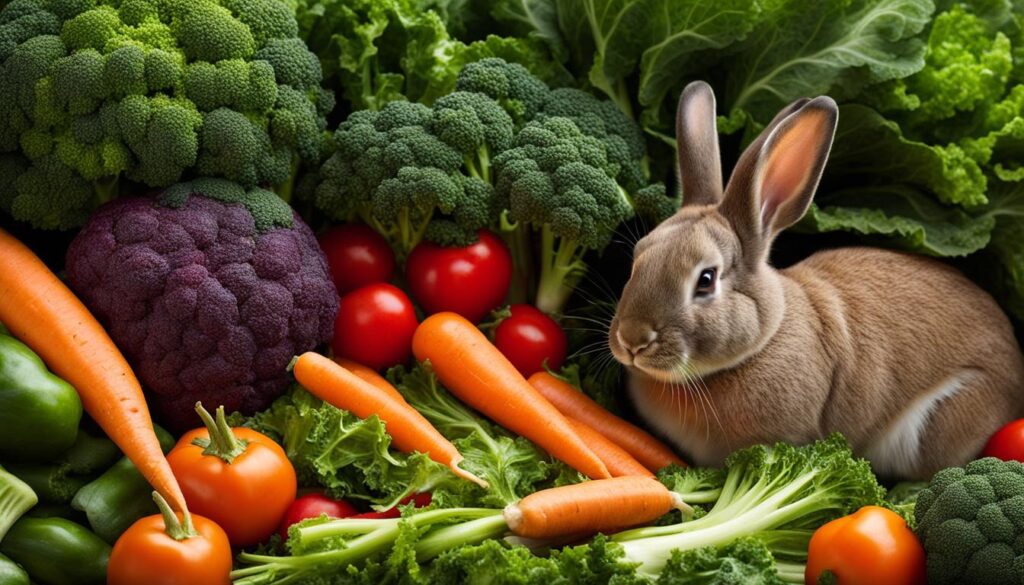
When it comes to treating our beloved bunnies, it’s important to provide them with snacks that are not only delicious but also safe and healthy. While popcorn may not be the best choice for rabbits, there are plenty of alternative treats that you can offer to keep them happy and satisfied.
Safe Foods for Rabbits
Rabbits can enjoy a wide variety of fresh fruits and vegetables as treats. Carrots, apples, and leafy greens like kale and spinach are all great options. These foods are not only tasty, but they also provide essential vitamins and minerals that contribute to a healthy diet for your furry friend.
It’s important to introduce new foods gradually and in moderation to avoid upsetting your rabbit’s sensitive digestive system. Start by offering a small amount of the new treat and observe your rabbit’s reaction. If they enjoy it and show no signs of digestive distress, you can gradually increase the portion size.
Alternative Treats for Rabbits
In addition to fresh fruits and vegetables, there are other alternatives that your rabbit may enjoy. Timothy hay-based treats, such as hay cubes or biscuits, are a great option. These treats are not only tasty but also provide added fiber, which is essential for proper digestion.
You can also consider offering your rabbit small portions of safe herbs and flowers, such as parsley, dandelion leaves, or cilantro. These natural treats can provide added variety and enrichment to your rabbit’s diet.
Remember, treats should only make up a small portion of your rabbit’s overall diet. The majority of their nutrition should come from a balanced mix of hay, fresh vegetables, and limited pellets. If you’re unsure about the suitability of a specific treat, it’s always best to consult with your veterinarian.
Establishing a Balanced Diet for Your Rabbit
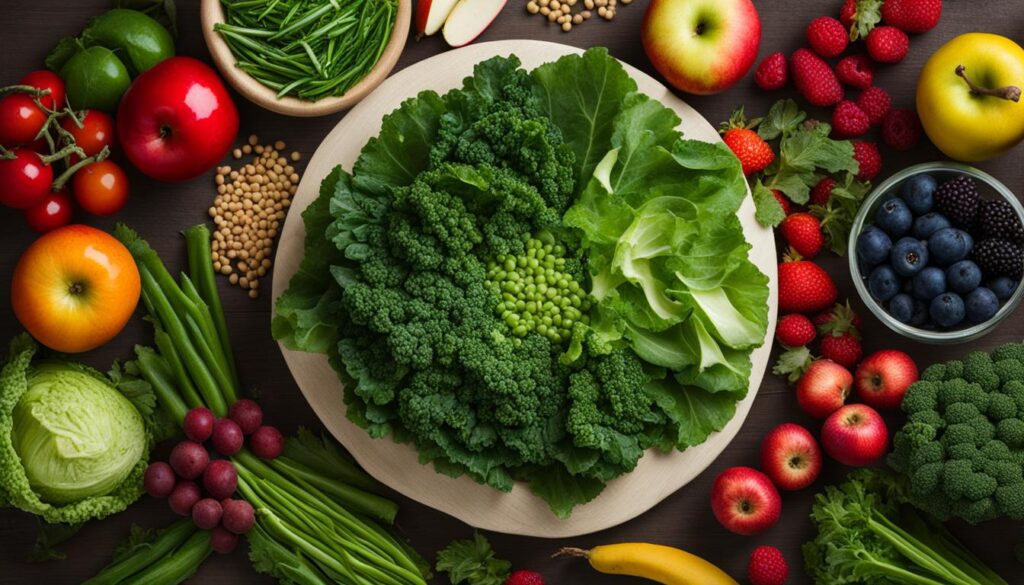
Rabbits, like any other animals, require a balanced diet to ensure their overall health and well-being. As responsible rabbit owners, it is crucial to provide them with the right nutrition and portion control. Here are some essential guidelines to help you establish a well-rounded diet for your furry friend:
1. Prioritize Fresh Hay
Fresh hay should be the main component of your rabbit’s diet. It provides essential fiber, aids in digestion, and helps wear down their teeth. Offer unlimited amounts of grass hay, such as timothy or orchard grass, to ensure proper dental and digestive health.
2. Incorporate Fresh Vegetables
Introduce a variety of fresh vegetables into your rabbit’s diet. Leafy greens like kale, romaine lettuce, and cilantro are excellent choices. Aim for a daily serving of two cups of fresh veggies per five pounds of your rabbit’s body weight. Remember to introduce new vegetables gradually to prevent digestive upset.
3. Monitor Pellet Intake
Pellets can be a part of your rabbit’s diet, but they should be fed in moderation. Choose high-quality pellets specifically formulated for rabbits, and offer a quarter to a half a cup of pellets per five pounds of body weight per day. Avoid brands with added sugars, seeds, or colored pieces.
4. Provide Fresh Water
Always ensure your rabbit has access to clean, fresh water at all times. Use a sturdy water bottle or dish that is changed daily to promote hydration and overall health. Regularly check the water source to ensure it is functioning properly.
By following these guidelines and consulting with a veterinarian for personalized advice, you can establish a balanced diet that meets your rabbit’s nutritional needs. Remember, maintaining a healthy diet is vital for your rabbit’s well-being and can contribute to a long and happy life.
Signs of an Unhealthy Diet in Rabbits
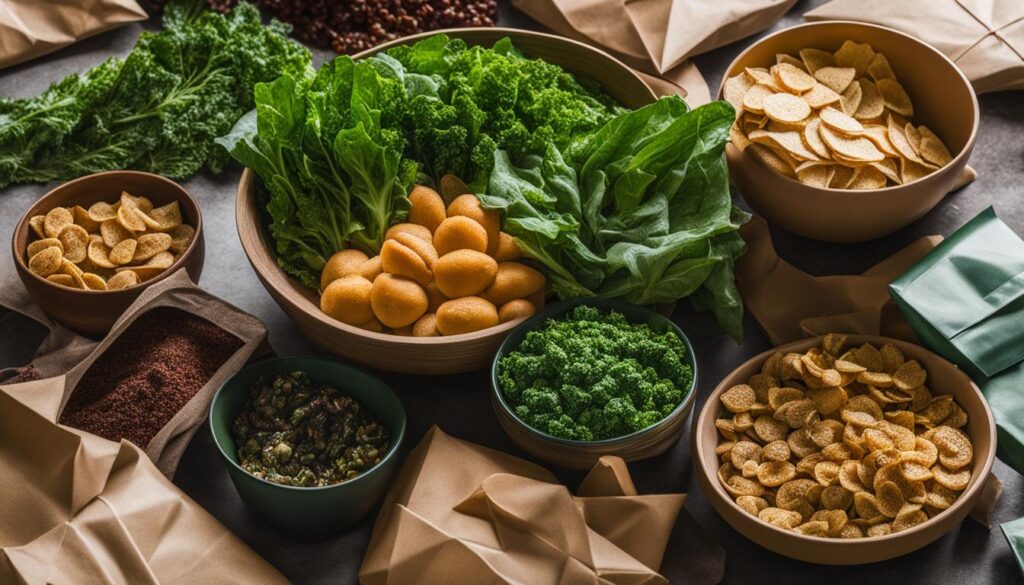
Ensuring your rabbit has a healthy and balanced diet is crucial for their overall well-being. An unhealthy diet can lead to various health issues and discomfort for your furry friend. By being aware of the signs of malnutrition and an unhealthy diet, you can take necessary steps to address any nutritional problems promptly.
Signs of Malnutrition in Rabbits:
- Weight loss or excessive weight gain
- Dull or matted fur
- Lack of energy or lethargy
- Changes in fecal consistency or frequency
- Dental problems such as overgrown teeth
- Weakened immune system leading to frequent illnesses
Rabbit Health Issues:
Unhealthy rabbit diets can contribute to various health problems. Digestive issues are common, including GI stasis, where the digestive system slows down or stops functioning properly. This can result in bloating, gas, and discomfort for your rabbit. Obesity is another concern linked to poor diets, as excessive weight gain can strain their joints and lead to a range of health issues. Vitamin deficiencies can weaken their immune system, making them more susceptible to infections and diseases.
If you notice any of these signs or suspect that your rabbit’s diet may be contributing to their health issues, it’s crucial to consult a veterinarian. They can provide proper diagnosis and guidance to help you improve your rabbit’s nutrition and overall health. Remember, a well-balanced diet is key to keeping your furry friend happy and healthy!
Rabbit Care Tips: Providing Proper Nutrition and Care
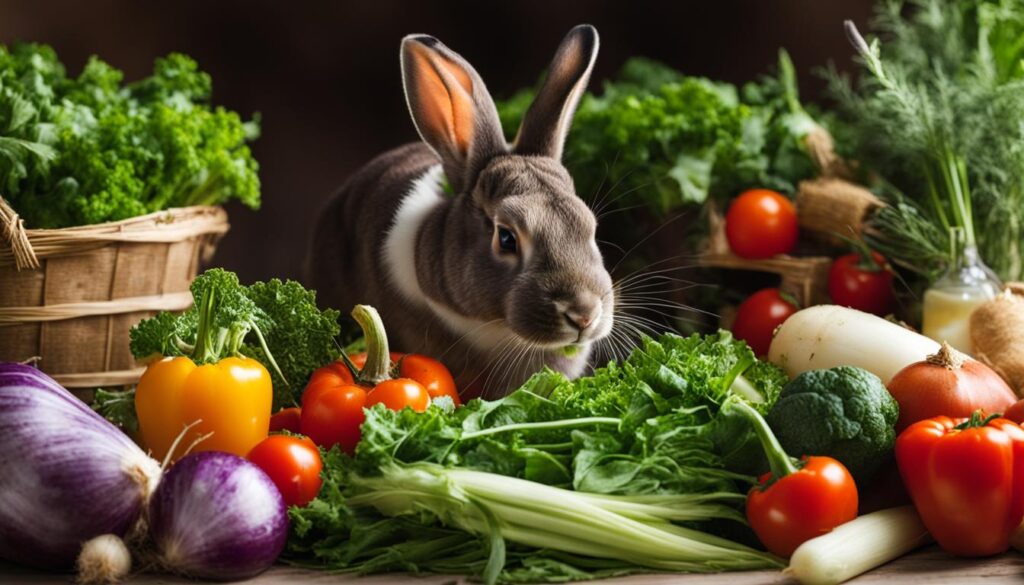
When it comes to caring for rabbits, it’s important to prioritize their health and well-being. This includes providing them with a well-balanced diet and proper care. Here are some essential rabbit care tips and best practices for their nutrition and overall care.
Feeding Guidelines:
- Offer a variety of fresh vegetables and hay as the main components of their diet.
- Limit the intake of pellets, as they should only make up a small portion of their diet.
- Introduce new foods gradually to avoid digestive upset.
- Ensure they have access to fresh water at all times.
By following these feeding guidelines, you can ensure that your rabbit receives the necessary nutrients for optimal health. Consulting with a veterinarian can also provide valuable insights into your specific rabbit’s dietary needs.
Proper Housing and Exercise:
- Provide a spacious and safe living environment for your rabbit, whether it’s a hutch or an indoor enclosure.
- Ensure the living area is clean and free from potential hazards.
- Allow your rabbit plenty of exercise by providing them with a designated play area or supervised time outside of their enclosure.
- Offer toys and mental stimulation to keep your rabbit entertained and prevent boredom.
Creating a suitable living space and promoting regular exercise will help keep your rabbit physically and mentally active, contributing to their overall well-being.
Regular Veterinary Check-ups:
- Schedule regular check-ups with a rabbit-savvy veterinarian to monitor your rabbit’s health.
- Discuss any concerns or questions you may have about their diet or behavior.
- Keep up with vaccinations and preventive treatments to protect against common rabbit illnesses.
Regular veterinary care is essential in catching any potential health issues early on and ensuring your rabbit receives the best possible care.
By following these rabbit care tips and best practices, you can provide your furry friend with a happy and healthy life. Remember, every rabbit is unique, so it’s important to tailor their care and nutrition to their specific needs. With proper care, your rabbit can thrive and bring joy to your life for years to come.
Conclusion
In conclusion, we have debunked the myth that rabbits can eat popcorn as a regular part of their diet. While it may be tempting to offer them this popular snack, it is important to prioritize their health and stick to a diet that consists of hay, fresh vegetables, and limited pellets.
Rabbits have specific dietary needs and delicate digestive systems that require a balanced and nutritious diet. Popcorn, although seemingly harmless, is low in nutritional value for rabbits and high in carbohydrates, which can lead to weight gain and digestive issues. Therefore, it should only be given occasionally as a small treat, if at all.
Instead of popcorn, there are numerous healthy alternatives you can provide for your rabbit’s snacks. Fresh fruits and vegetables like carrots, apples, and leafy greens are great options that offer both taste and nutrition. Remember to introduce new foods gradually and in moderation to avoid any potential digestive disturbances.
By understanding the importance of a well-balanced diet for rabbits and being mindful of their specific nutritional needs, we can ensure their long-term health and happiness. So let’s prioritize their diet and offer them the best possible care they deserve!
FAQ
Can rabbits eat popcorn?
While popcorn may seem like a harmless snack, it is not an ideal food for rabbits. Popcorn is low in nutritional value for rabbits and high in carbohydrates, which can lead to weight gain and digestive issues. It should only be given occasionally as a small treat, if at all.
What should rabbits eat?
Rabbits should primarily eat hay, fresh vegetables, and limited amounts of pellets. These provide the necessary nutrients and fiber for their unique digestive system. Treats like fresh fruits and vegetables, such as carrots, apples, and leafy greens, can also be given in moderation.
Are there other healthy treats for rabbits besides popcorn?
Yes, there are many other healthy and safe treats you can offer your rabbit. Fresh fruits and vegetables like carrots, apples, and leafy greens are great options. Just remember to introduce new foods gradually and in moderation.
How much should I feed my rabbit?
Proper portion control is key in feeding rabbits. Overfeeding can lead to obesity and other health issues. It’s important to consult with a veterinarian to create a suitable diet plan for your rabbit based on their specific needs.
What are the signs of an unhealthy diet in rabbits?
Signs of an unhealthy diet in rabbits may include digestive issues, dental problems, obesity, or vitamin deficiencies. If you notice any concerning symptoms, it is important to consult a veterinarian for guidance.
How can I ensure my rabbit is getting a balanced diet?
To ensure your rabbit receives a balanced diet, provide a variety of fresh foods, hay, and limited pellets. Consulting with a veterinarian can help you create a suitable diet plan for your rabbit’s specific needs. Regular veterinary check-ups, proper housing, and mental stimulation are also important for their overall well-being.
What is the importance of proper care and nutrition for rabbits?
Proper care and nutrition are essential for the health and well-being of rabbits. Educating ourselves about their dietary needs helps us provide them with a well-balanced diet, reducing the risk of health problems. Regular veterinary check-ups, suitable housing, and mental stimulation are also important aspects of responsible rabbit ownership.
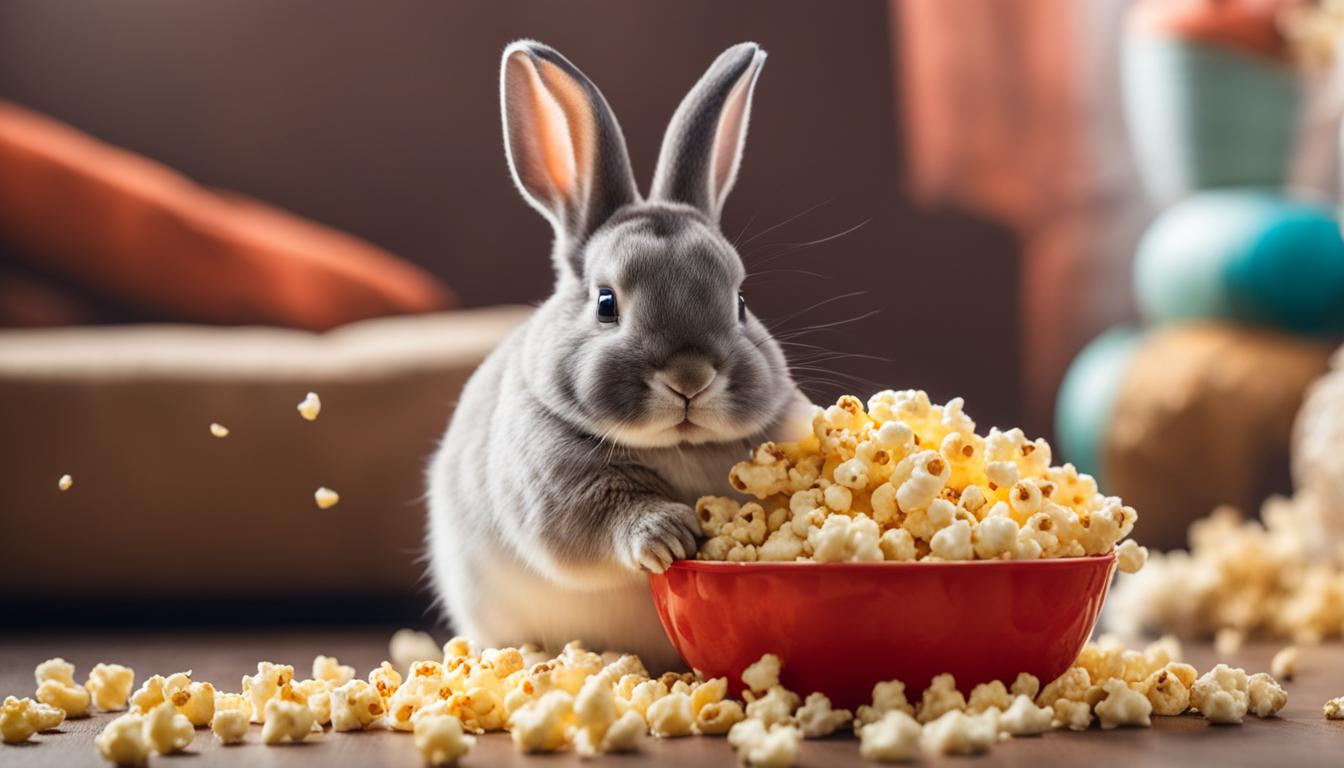
Leave a Reply